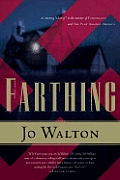
| Series: | Small Change #1 |
| Publisher: | Tor |
| Copyright: | August 2006 |
| ISBN: | 0-765-31421-5 |
| Format: | Hardcover |
| Pages: | 319 |
Lucy Kahn is the daughter of a British lord and the newly-wed wife of a London Jewish banker who specializes in loans to those frequently discriminated against. She married against the disapproval of her parents, particularly her mother, who was not at all happy with her daughter marrying a Jew. Her parents and their circle of friends are the Farthing set, a group of British lords and politicians who were responsible for a lasting peace with Hitler and the Reich after an isolationist United States failed to enter the war. During a party at the Farthing house, one of the set is discovered murdered, the murder marked by a Jewish star such as Jews are required to wear on the continent apparently to frame her husband.
Farthing is a murder mystery set in an alternate 1949, amidst a backdrop of a strongly class-conscious and anti-Semitic Britain that has made a peace with Hitler and is desperately afraid of the Bolsheviks. It is told through two alternating points of view: a first-person story told by Lucy that has some of the concerns and mannerisms of a comedy of manners but with more serious subject matter as the book progresses, and a detached third-person focused on the detective who is investigating the case. The contrast of viewpoints is delightful. Lucy strikes one as scatterbrained and a bit silly at the start of the book and gains the reader's trust and respect through the story while never changing her core personality. Carmichael's sections start with the dry tone of a classic methodical detective but become more emotional and less detached as the true nature of the story unfolds.
For a substantial portion of the book, Farthing is a mystery novel crossed with a story of interpersonal tension among the upper crust. It fulfills the expectations of both genres in a satisfying and page-turning story. Walton has an exquisite grasp of voice and perspective, and that's the core of what makes this story so good. Carmichael is immediately likeable in a classic detective mode, a key fulcrum for the sharp and effective shift Walton pulls off at the end of the book. And Lucy is the sort of character one underestimates a bit at first but then respects more and more as she shows a perceptiveness and effectiveness in dealing with unexpected situations. The mystery is a twisty maze of motives, evidence, and complications that would do any traditional mystery novel proud — a maze, I should note, that Walton keeps clear, consistent, and understandable. She does this with an effortlessness that belies the difficulty of it. I found the details of the mystery less confusing and easier to remember than any mystery novel I've read recently.
But this is an alternate history for a reason, and it doesn't stay a simple mystery novel. Politics are afoot, the anti-Semitism and discrimination are not simply backdrop, and Farthing undergoes a sinister transformation. This I admit I found a bit rocky. Not preachy, mind; despite clear resonance and inspiration from current affairs in both Britain and the United States, Walton is writing a story that plays by its own rules and never puts a message ahead of its plot. The problem was more that the use to which the murder is put, while not coming out of nowhere, sets off a chain of dominoes that the reader isn't given a clear look at before they start falling. It may be lack of attention on my part, but I kept being caught slightly by surprise by how fast certain things happened. A character who becomes prime minister wasn't clearly established previously as that high in the government or the party. Laws that are enacted didn't have a groundwork shown on camera. Photo ID cards (a significant controversy in Britain at the moment) appear rather suddenly without grounding that controversy in the world of the novel. The political consequences are quite believable, but they're believable sometimes by analogy rather than as a consequence of events already shown. Knowing how things play out in our world, I can easily fill in the background details with my imagination, but that act of drawing on details from our world threw me partly out of the story in places.
This, though, is a minor complaint about the backdrop; the front-and-center plot is excellent all the way through. Walton adds overtones and political suspense without compromising the pleasures of the initial mystery plot, and the combination had me unwilling to put the book down. I read Farthing straight through in a single day and stayed up to finish it, despite not being a fan of alternate history and an anti-fan of anything whatsoever related to Nazis or World War II. This is not a typical extended working-out of an alternate timeline, stuffed full of irrelevant research and minutia of divergence. It's a spare, lean book in which each scene and character is effective, the exposition is deft and brief, and the background stays out of the way of the story. Recommended, even if you don't think this is your genre.
Followed by Ha'penny.
Reviewed: 2006-10-29